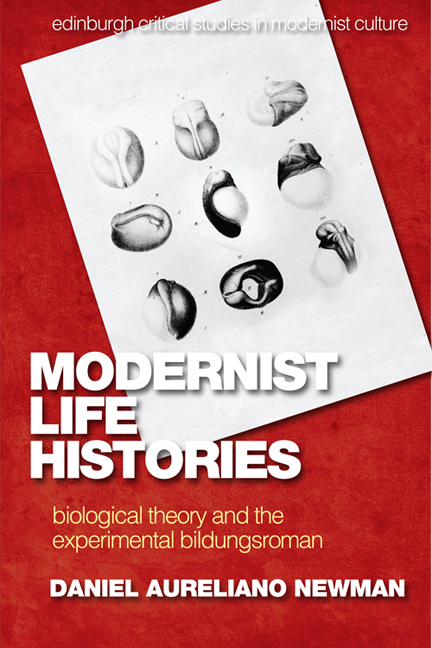Book contents
- Frontmatter
- Contents
- List of Figures
- Preface
- Acknowledgements
- Series Editors’ Preface
- List of Abbreviations
- Introduction
- 1 Bildung, Biology and the Narrative Structure of Development
- 2 A Portrait of the Artist as a ‘Biologist in Words’: Language, Epiphany and Atavistic Bildung
- 3 Mendelian Inheritance, ‘Eternal Differences’ and Entropy in Howards End
- 4 ‘Tampering with the Expected Sequence’: Heterochrony and Sex Change in Orlando
- 5 Anachrony, Neoteny and the ‘Education of an Amphibian’ in Eyeless in Gaza
- 6 Beginning Again: Darwin’s Caterpillar from George Eliot to Beckett
- Conclusion
- Bibliography
- Index
2 - A Portrait of the Artist as a ‘Biologist in Words’: Language, Epiphany and Atavistic Bildung
Published online by Cambridge University Press: 23 April 2021
- Frontmatter
- Contents
- List of Figures
- Preface
- Acknowledgements
- Series Editors’ Preface
- List of Abbreviations
- Introduction
- 1 Bildung, Biology and the Narrative Structure of Development
- 2 A Portrait of the Artist as a ‘Biologist in Words’: Language, Epiphany and Atavistic Bildung
- 3 Mendelian Inheritance, ‘Eternal Differences’ and Entropy in Howards End
- 4 ‘Tampering with the Expected Sequence’: Heterochrony and Sex Change in Orlando
- 5 Anachrony, Neoteny and the ‘Education of an Amphibian’ in Eyeless in Gaza
- 6 Beginning Again: Darwin’s Caterpillar from George Eliot to Beckett
- Conclusion
- Bibliography
- Index
Summary
A developing organism is … a system struggling with the help of its ancestral tendencies to survive and to convert itself into successive viable shapes.
– Gavin de Beer, ‘Embryology and Evolution’ (1938: 63)‘In the history of words there is much that indicates the history of men’, writes James Joyce as a student at University College. This history, he continues, is forged by a vanguard of literary masterpieces, ‘landmarks in the transition of a language, keeping it inviolate, directing its course straight on like an advancing way, widening and improving as it advances but staying always on the high road’ (1959: 28–9). Joyce's enthusiastic rhetoric of national destiny, perfectibility and imperialism may seem surprising in light of his later writings, which would so playfully yet forcefully attack notions of historical progressivism. But these are the words of a youth seventeen or eighteen years old, written for the approval of a schoolmaster. Anyhow, Joyce would soon disavow them, submitting the parallels between development, evolution, history and philology to increasingly byzantine travesties and parodies.
‘Oxen of the Sun’ offers a stark case, with its overdetermined parallelism of fertilisation, embryological development, parturition, biological and linguistic evolutions, and progressive inebriation. Its seemingly linear structure conceals numerous reversions, which produce a humorous yet urgent critique of recapitulation theory. Though Joyce models ‘Oxen’ on ‘the natural stages of development in the embryo and the periods of faunal evolution in general’ (U 907), the relations between individual and evolution as he depicts them are hardly parallel. If the debates constituting the episode are ‘the epitome of the course of a life’ (U 397), it is a topsy-turvy life indeed, for as Mary King argues, ‘Oxen’ is ‘a multilayered contrapuntal score, a fugal canon with aleatory characteristics, in which a disrupted pseudolinear mimesis of the movement of English prose and its validating texts is a simulacrum for the development of a male fetus’ (U 350). If recapitulation theory requires the embryo's successive passage through increasingly perfect forms, Joyce offers ‘abortions’, ‘monstrous births’, ‘swineheaded … or doghaired infants’, and ‘cases of arrest of embryonic development at some stage antecedent to the human’ (U 372, 391).
- Type
- Chapter
- Information
- Modernist Life HistoriesBiological Theory and The Experimental Bildungsroman, pp. 54 - 79Publisher: Edinburgh University PressPrint publication year: 2018

